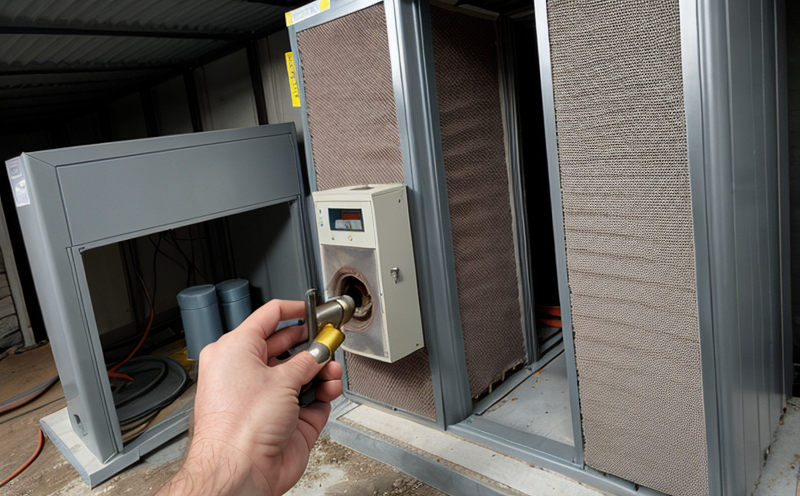Thermal performance testing of industrial filter fabrics
In today’s industrial environments, where efficiency and safety are paramount, ensuring that filtration systems perform optimally is critical. One key aspect of this optimization involves the thermal performance testing of industrial filter fabrics. This service plays a crucial role in verifying that these materials can withstand extreme temperature conditions while maintaining their integrity and functionality.
Industrial filter fabrics are used in various sectors including automotive, aerospace, HVAC, and oil & gas, where they serve as critical components for air filtration systems. The thermal performance of these fabrics ensures they do not degrade under high temperatures, which can lead to reduced efficiency or even catastrophic failure of the entire system.
The testing process involves subjecting the filter fabric samples to controlled temperature environments that simulate real-world conditions. This allows us to evaluate how well the material retains its structural integrity and filtration efficiency over time. The primary goal is to ensure that these fabrics meet the stringent requirements set by international standards such as ISO, ASTM, EN, and IEC.
During testing, we carefully prepare samples according to industry best practices. This includes ensuring uniformity in sample size and shape, which are essential for accurate test results. Once prepared, specimens are placed into our state-of-the-art thermal chambers where they undergo rigorous temperature cycling from sub-zero conditions up to 100°C or higher.
Our sophisticated instrumentation enables precise control over environmental factors such as humidity levels, air flow rates, and pressure differentials across the fabric. This comprehensive approach ensures that we capture every aspect of how the material behaves under thermal stress. After each cycle, our technicians conduct thorough inspections for any signs of damage or deterioration.
Following testing, detailed reports are generated summarizing all findings including changes in porosity, permeability, and filtration efficiency. These reports provide valuable insights into not only current performance but also potential lifespan under expected operating conditions.
By leveraging this service, clients can make informed decisions about material selection for new projects or modifications to existing systems. It helps avoid costly mistakes by identifying suboptimal materials early in the design phase. Additionally, it supports ongoing compliance with regulatory requirements and enhances overall product quality.
In summary, thermal performance testing of industrial filter fabrics is an indispensable tool in maintaining high standards within industries reliant on reliable filtration solutions. Through rigorous evaluation processes based on recognized international guidelines, we empower manufacturers to create products that not only meet but exceed expectations regarding reliability and durability.
Applied Standards
The thermal performance testing of industrial filter fabrics adheres strictly to a series of internationally recognized standards designed specifically for this application. These include:
- ISO 11095:2009 – This standard provides methods for determining the resistance to air flow through woven and non-woven fabrics.
- ASTM D737-18e1 – Offers guidelines on testing fabric resistance to water vapor permeation, which is crucial when considering thermal insulation properties.
- EN ISO 9237:2016 – Specifies procedures for measuring the heat and flame resistance of fabrics used in protective clothing.
- IEC 60601-2-58 – Focuses on the requirements concerning materials, components, and assemblies intended to be used in medical electrical equipment or systems.
Quality and Reliability Assurance
Ensuring consistent quality and reliability is at the core of our thermal performance testing service. Here’s what we do:
- We employ highly trained technicians who adhere strictly to prescribed procedures laid out in relevant standards.
- All equipment used for testing undergoes regular calibration checks to maintain accuracy.
- Each test sample is handled with care, ensuring that no external factors influence the outcome.
- Data collected from each experiment is meticulously recorded and analyzed using advanced software tools.
Competitive Advantage and Market Impact
By incorporating thermal performance testing into their product development process, manufacturers gain several competitive advantages:
- Innovation Leadership: Early identification of superior materials fosters innovation.
- Cost Savings: Avoidance of costly redesigns due to poor material choice.
- Enhanced Reputation: Meeting or exceeding industry standards builds trust among customers and stakeholders.
In today’s competitive market, being able to demonstrate robust thermal performance is essential for maintaining a strong brand presence. Our clients benefit from enhanced product performance, which translates directly into increased customer satisfaction and loyalty.





